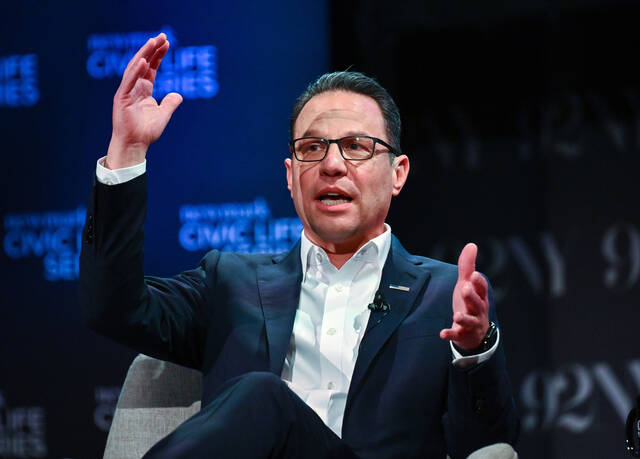As more states look to online sports betting as a way to bolster their budgets, Pennsylvania for several years has been reaping the benefits of the now billion-dollar industry.
Since Rivers Philadelphia, formerly SugarHouse Casino, opened the state’s first virtual sportsbook in May 2019, online wagers on sporting events have totaled nearly $6 billion, according to data from the Pennsylvania Gaming Control Board. That makes up the majority of the $6.7 billion in total sports bets wagered since it was legalized in 2018.
Of dollars brought in by online sports wagering — which has grown into 12 mobile and online sportsbooks, according to the American Gaming Association — $92.8 million has been collected by Pennsylvania through a 34% tax. Another $5.46 million has filtered to local communities through a 2% local share assessment tax.
Those dollars have elevated Pennsylvania to one of the biggest sports betting states in the country, trailing only Nevada and New Jersey. As those industries have matured, they have each generated millions of dollars, seemingly catching the eye of others states now hoping to legalize online sports betting to help relieve cash-strapped budgets.
“It is not necessarily going to be the singular answer to the states’ budget questions, but it certainly can be an important piece of that as we see more and more sports fans get interested in sports betting and are drawn to that form of entertainment,” said Jess Feil, vice president of government relations and gaming policy counsel for the American Gaming Association.
Currently, 15 states and Washington, D.C., permit online sports betting. That number is expected to grow this year — to possibly include Arizona, Connecticut, Louisiana, Maine, Maryland, Massachusetts and Ohio, the Associated Press reported.
New York in April became the latest state to make moves toward legalizing the industry, when lawmakers passed a budget that included mobile sports wagering. The measure is expected to be signed by Democratic Gov. Andrew Cuomo after years of opposition — a decision Feil attributed directly to budgetary pressures. If passed, New York could become one of the largest U.S. markets and would attract dollars largely bet in neighboring New Jersey.
By 2025, mobile sports betting alone is expected to generate nearly $500 million a year in tax revenue, the New York State Comptroller has estimated.
Florida lawmakers last week held a special session to consider legalizing mobile sports betting, the Tampa Bay Times reported.
“If you don’t offer mobile sports betting in your state, then the residents of your state are going to go elsewhere,” Feil said. “They’re going to go across state lines to their neighboring states to place the wagers in a way that’s more convenient to them, especially at a time when in-person activity is hard due to the pandemic.”
VIXIO GamblingCompliance, a company that tracks gambling legislation and performance, predicted that as many as 14 states could legalize or expand sports betting in 2021, the Associated Press reported. Revenue from legal sports betting could reach $3.1 billion this year across the U.S., and balloon to as much as $10 billion within five years, the company said.
Online leads way
But while the industry can help bolster state budgets, it is not a solution that will dissolve budgetary issues.
According to the National Conference of State Legislatures, while online sportsbooks can create a steady revenue stream, there are potential costs to weigh as well.
Feil, in reference to the gap between the amount wagered and tax dollars collected, noted that for every $100 wagered at a sportsbook, about $95 goes back to bettors through winnings. The remaining $5 is then used by the sportsbook to pay for taxes, licensing fees, overhead, employees, the retail sportsbook and data and infrastructure behind the product.
While states like Pennsylvania, which have already established the online market leading to year-over-year growth, revenue streams are much smaller compared to wagers placed.
Despite that gap, however, online sports bets have made up the majority of tax revenues generated in Pennsylvania by sports betting since 2019. The March report from the National Conference of State Legislatures suggested that sports betting revenues are relatively lower in states that do not offer mobile wagering, which was likely expedited by the pandemic.
During the seven months of 2019 when the industry was getting up and running in Pennsylvania, more than $1 billion was wagered online, resulting in $15.4 million in taxes, according to the state Gaming Control Board. That same year, $427 million in sports bets were wagered in-person, resulting in $14.7 million in taxes.
By 2020, online sports wagers totaled $3.27 billion and contributed $57.8 million in taxes, figures show. In-person wagers placed last year, which were prone to covid-19 mitigation orders that left casinos shuttered, totaled $302 million, bringing in $10.4 million in tax dollars.
Through March this year, mobile sports bets generated $1.56 billion in wagers, resulting in $24.9 million in taxes. Retail sportsbooks, by comparison, saw just $121 million in wagers, resulting in $3.7 million in taxes.
State dollars generated from both online and retail sportsbooks are funneled into the general fund, with .4% split between the Compulsive Gaming Treatment Fund and the state Department of Drug and Alcohol Programs. Dollars from the local share assessment tax is turned into grants that can be applied for by any of the state’s 67 counties.
Dollars in Pa.
Pennsylvania casinos with mobile sportsbooks also have seen continual growth in the amount wagered as well as taxable revenue streams. Locally, Rivers Casino on Pittsburgh’s North Shore and The Meadows Racetrack and Casino in Washington County offer online and mobile options.
Rivers opened its mobile sportsbook in June 2019 through BetRivers.com, which is owned by Rush Street Interactive.
According to Mattias Stetz, COO of Rush Street Interactive and BetRivers, the company’s mobile sportsbook has grown 50% year over year, with 75% of bets in 2021 placed online.
According to Gaming Control Board figures, $72 million in wagers were placed online at Rivers Pittsburgh in the first three months of the year compared to $200.4 million last year. Online wagers at the casino resulted in $3.7 million worth of tax dollars for the state and local communities last year and $1.19 million this year.
That’s compared to the $15.8 million in wagers placed in-person at Rivers Casino this year, generating more than $624,000 in taxes.
“We have to remember that the land-based casinos have been operating with limited capacity so far this year for big events like the Superbowl and March Madness,” Stetz said.
Similar numbers were seen at The Meadows, data show. Last year, the casino saw $823.2 million worth of mobile sports bets, resulting in $10.3 million in state and local taxes. So far this year, the facility has seen $371.8 million in mobile sports bets, resulting in $6 million worth of taxes, data show.
In-person bets this year have totalled $4.9 million and almost $189,000 in tax dollars.
Live! Casino Pittsburgh at Westmoreland Mall in Hempfield does not have an online sportsbook.
As the popularity of placing online wagers grows and more online and mobile sportsbooks open, the industry is expected to continue growing across Pennsylvania, Feil said.
“It’s an important part of the experience for gaming customers and patrons and it’s part of the way they engage with sports and with casinos more generally, so we see it as a growing space and moreover with online and mobile sports betting,” Feil said.
She added that as more states begin offering online and mobile sports betting, Pennsylvania will likely not be impacted.
“I don’t think you’ll necessarily see any negative effects from that besides more sports fans in several states having access to legal, regulated options,” Feil said.








